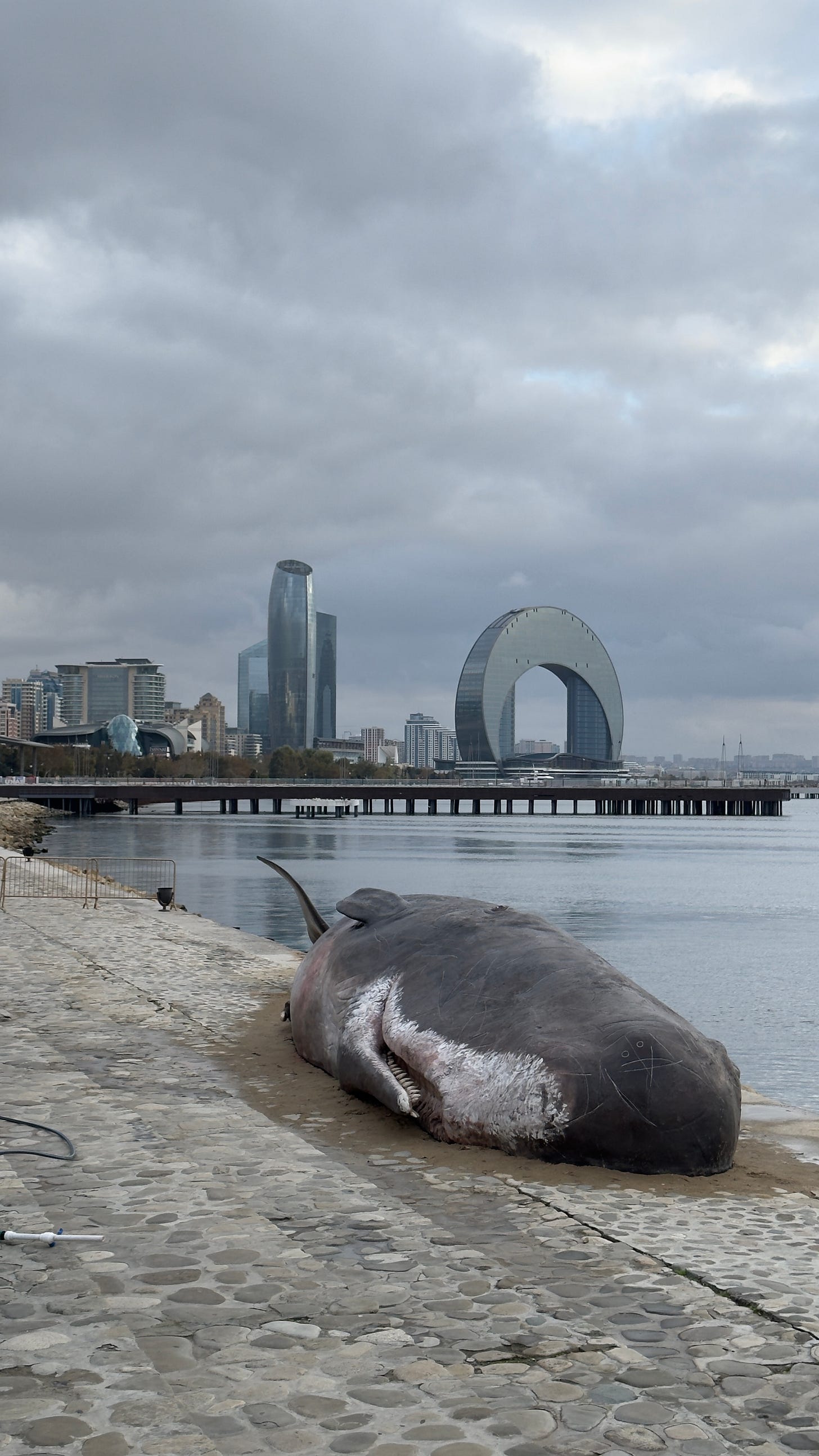🇳🇴 Norway Halts Deep-Sea Mining Plans:
A Collective Victory for Marine Conservation Advocates
In a decision that has sent waves across the global conservation community on December 1st, Norway has announced a halt to its deep-sea mining plans, at least for now. The move comes after intense pressure from scientists, activists, and environmental organizations worldwide, who have consistently highlighted the potential irreversible damage such activities could cause to fragile marine ecosystems. While this pause is not a definitive victory, it is a significant step in the right direction, emphasizing the power of collective advocacy.
➡️ To learn more about deep sea mining check out the documentary Deep Rising
🇦🇿 FINS INITIATIVE at COP29
The FINS Initiative was launched at COP29 in Baku and played a notable role in amplifying activists’ voices. Across nearly two weeks, the FINS pavilion became a hub for meaningful discussions, creative storytelling, and global outreach. Panel discussions, presentations, and film screenings, that also focused on Norway’s deep-sea mining plans and their implications for marine life. The urgency was further underscored by a peaceful protest held in the Green Zone, where participants carried posters calling for an immediate halt to this potentially destructive practice.
At COP29, the FINS Initiative became a global stage for discussing critical marine issues, including Norway’s deep-sea mining plans. With the involvement of renowned environmental organizations and experts, FINS hosted impactful panel discussions, thought-provoking presentations, and film screenings that highlighted the various threats that the ocean faces.
The initiative brought together an extraordinary coalition of organizations and individuals, including Seaspiracy’s Isabella Cavalletti, the Paul Watson Foundation UK’s Elissa Phillips, Great Whale Conservancy and Whale Guardians’ Michael Fishbach, Discover Sharks’ Jalil Najafov, Fish Free February’s Simon Hilbourne, Oceans Nation’s Lead Ambassador Matthew David Kaplan, and Deep Sea Guardians’ Zimy Da Kid.
Pelagic Divers Fuvahmulah’s Ahmed Inah, Oceangalz’s Maria Millan and Isa Lassinaro, Nakawe Project Global’s Regina Domingo and Leopoldo Sanmiguel, Mano Wahine Expeditions’ Andriana Fragola, and One Ocean Diving’s Ocean Ramsey and Juan Oliphant also joined forces. From the artistic perspective, Captain Boomer Collective’s Bart Van Peel brought his iconic Whale installation, while Emmy Award-winning cinematographer Maxwel Hohn, and filmmaker Eli Roth contributed their expertise and passion.
The FINS Initiative’s esteemed members collectively brought attention to Norway’s deep-sea mining plans during COP29. At the same time, the pavilion became a hub for vital discussions on shark conservation, dolphin protection, sustainable fishing practices, and other pressing marine issues. Complementing these discussions were two powerful photo exhibitions—one at the COP29 Green Zone and another in the heart of Baku. These exhibitions captivated audiences with their evocative portrayal of marine ecosystems, highlighting both their beauty and vulnerability.
Adding to the powerful storytelling were screenings of transformative films, including Eli Roth’s FIN, the late Rob Stewart’s Sharkwater and Revolution, our groundbreaking documentary Seaspiracy, and the investigative film Whale Wash, which delves into the realities of modern whaling in Norwegian waters. These films illuminated the devastating realities of ocean exploitation and environmental decline. Presentations by experts like Michael Fishbach offered profound insights into marine life and actionable strategies to protect it, further enriching the dialogue.
Outside the COP29 venue, the life-size sperm whale installation by the Captain Boomer Collective became an iconic symbol of the event. Installed along the Baku Boulevard, the hyper-realistic whale blurred the lines between art and activism, stirring local and global audiences alike. Media coverage of the whale installation spanned television, radio, newspapers, and online platforms in nearly every country, amplifying FINS’ reach to hundreds of millions, if not billions, and cementing its message of urgency and unity in marine conservation.
Norway’s decision serves as a powerful reminder that advocacy can drive change, but it also underscores the need for continued vigilance. This pause may be temporary, and the risk of the decision being reversed remains significant. At the same time, other critical issues demand urgent attention, including ongoing whaling practices, dolphin hunts in the Faroe Islands, the devastating global impact of shark fishing, and the alarming decline in the population of Caspian seals, a poignant concern for the COP29 host country.
The FINS Initiative, making its debut at COP29, exemplified the impact of uniting diverse voices for a shared mission. By fostering a global network, sharing compelling stories, and raising widespread awareness, the initiative has laid the groundwork for long-term change. As a poignant reminder, the words displayed at the conclusion of FINS’ photo exhibition resonated deeply: "End can be changed."
This spirit of collaboration and determination suggests that the fight for the oceans and marine life will continue with renewed vigor. Through sustained collective efforts, meaningful progress is within reach.







